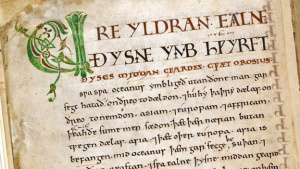Language/Old-english-ca-450-1100/Grammar/Conditional-Mood
Hi Old English (ca. 450-1100) learners! 😊
In today's lesson, we will be discussing the conditional mood in Old English (ca. 450-1100). This is an important part of the language and understanding it will help you to communicate more effectively.
Take a moment to explore these relevant pages as you conclude this lesson: Pronouns, Plurals & Negation.
Overview[edit | edit source]
The conditional mood is used to express a hypothetical situation or condition. It is used to express a wish, a possibility, or a probability. In Old English (ca. 450-1100), the conditional mood is formed by adding the suffix -e to the verb stem.
Examples[edit | edit source]
Here are some examples of the conditional mood in Old English (ca. 450-1100):
- Ic wille - I would
- Þu wolde - You would
- Heo wolde - She would
- We wolden - We would
- Ge wolden - You (plural) would
- Hi wolden - They would
Usage[edit | edit source]
The conditional mood is used to express a hypothetical situation or condition. It can be used to express a wish, a possibility, or a probability. For example, if you wanted to express the idea that something might happen, you could use the conditional mood.
For example, if you wanted to say "I might go to the store", you could say "Ic wille to þæm stære faran" (I would go to the store).
The conditional mood can also be used to express a wish. For example, if you wanted to say "I wish I could go to the store", you could say "Ic wille to þæm stære faran" (I would go to the store).
The conditional mood can also be used to express a probability. For example, if you wanted to say "It is likely that I will go to the store", you could say "Ic wille to þæm stære faran" (I would go to the store).
Conclusion[edit | edit source]
In conclusion, the conditional mood is an important part of Old English (ca. 450-1100) grammar. It is used to express a hypothetical situation or condition, such as a wish, a possibility, or a probability. By understanding how to use the conditional mood, you will be able to communicate more effectively in Old English (ca. 450-1100).
If you have any questions, please ask them in the comments section below.
Feel free to edit this wiki page if you think it can be improved. 😎
Other Lessons[edit | edit source]

